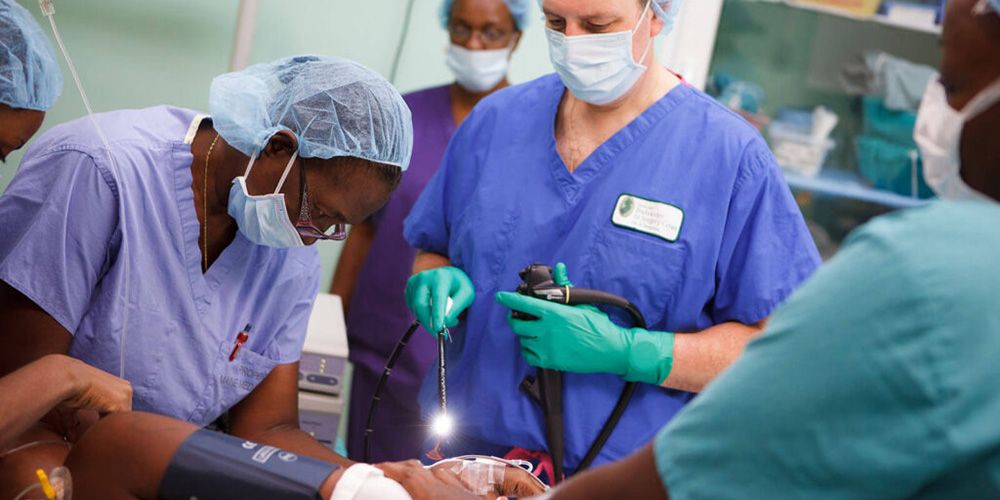Each year, more than 62 million Americans are diagnosed with a digestive disorder—most of which are very complex, with subtle symptoms. This is where skilled gastroenterologists come in.
But what is a gastroenterologist, you ask? A subspecialty of internal medicine, gastroenterology involves the diagnosis and treatment of diseases of the digestive organs, including the stomach, bowels, liver, and gallbladder. Patients across demographics rely on the expertise of these specialists to uncover the source of a range of uncomfortable symptoms.
If you’re a problem solver by nature with an innate attention to detail, you might thrive in this diagnostic role. Read on as we explore the details of this dynamic medical specialty.
What does a gastroenterologist do?
Patients are referred to a gastroenterologist when they are suffering from digestive issues. The work these specialists do requires a detailed understanding of the normal functions of the gastrointestinal organs—this helps them pinpoint abnormalities.
In their diagnostic efforts, gastroenterologists may observe the movement of material through the stomach and intestine, the digestion and absorption of nutrients into the body, the removal of waste from the system, and the function of the liver as a digestive organ. In doing so, they’re able to locate potential anomalies that may indicate common conditions, including:
- Colon polyps and cancer
- Cirrhosis and other chronic liver diseases
- Gastrointestinal reflux
- Peptic ulcer disease
- Inflammatory bowel diseases (such as Crohn’s disease and ulcerative colitis)
- Irritable bowel syndrome
- Pancreatitis
- Endoscopic retrograde cholangiopancreatography (ERCP) to address numerous biliary pathologies
Gastroenterologists are trained extensively in endoscopy, which is the use of flexible scopes with built-in cameras to visualize the inside of the intestinal tract. This training includes detailed study of how and when to perform endoscopy, therapeutic interventions to intervene on various pathology, optimal methods to complete these tests effectively and safely, and the proper use of sedating medications to ensure the comfort and safety of patients.
These physicians are also trained in advanced procedures such as endoscopic biliary examination (including stone removal), endoscopic mucosal resection, placement of internal drainage tubes, and endoscopic ultrasound. Once a diagnosis is reached, gastroenterologists work in tandem with a patient’s primary care team to craft a treatment plan.
How do you become a gastroenterologist?
Physicians who specialize in gastroenterology exhibit extreme dedication and attention to detail. As such, the path to becoming a gastroenterologist is quite rigorous.
After spending four years completing medical school and clinical rotations, you’ll need to participate in a three-year internal medicine residency. This is then followed by a gastroenterology fellowship, which will take an additional 2–3 years. The fellowship is where you’ll learn how to evaluate patients with gastrointestinal symptoms, treat a broad range of digestive conditions, and provide recommendations to maintain health and prevent disease.
Upon completing a gastroenterology fellowship, you’ll become “board eligible.” This qualifies you to take the Gastroenterology Certification Exam administered by the American Board of Internal Medicine.
Interested in becoming a gastroenterologist?
Gastroenterologists are highly trained specialists who use their comprehensive knowledge of the entire gastrointestinal tract to provide high-quality diagnostic care for patients experiencing uncomfortable digestive issues. In many cases, these physicians are able to provide answers, treatment, and ultimately relief for their patients.
Now that you have an answer to “What is a gastroenterologist?” you may be wondering if it’s the right medical specialty for you. If you’re drawn to the idea of uncovering answers to difficult medical questions through the use of complex diagnostic and therapeutic procedures, you could thrive in a gastroenterology career.
The most effective way to get started is to seek out a high-quality medical school that can provide you with the education and training you’ll need. Learn more about what you should be looking for in our article “How to Choose a Medical School: 8 Things to Evaluate.”


